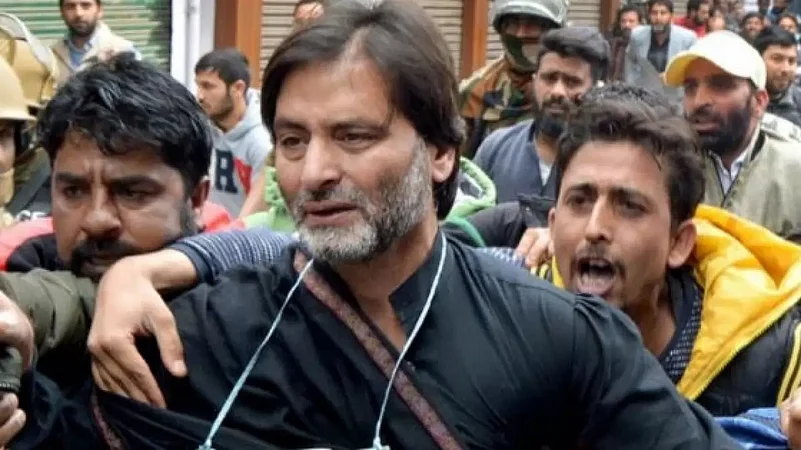The Delhi High Court on Friday directed that separatist leader Yasin Malik be virtually produced before it from jail in connection with the NIA's plea seeking death penalty for him in a terror funding case.
Allowing an application by the jail superintendent citing security concerns, a bench headed by Justice Siddharth Mridul said the Jammu and Kashmir Liberation Front chief, who is presently serving a life term in the case, need not be produced in person and modified an earlier order seeking his physical presence.
“In view of the matter, the order dated May 29, 2023 is necessarily modified to the extent that the jail superintendent is directed to produce Yasin Malik in the present appeal through video conferencing alone on August 9 and not in person,” ordered the bench, also comprising Justice Anish Dayal.
The high court had, on May 29, issued warrants for production of Malik, who is presently serving a life term in the case in Tihar jail, on August 9 when NIA's plea for enhancement of sentence is listed for hearing.
The Delhi government standing counsel informed the court there was an order by the President directing that Malik cannot be “moved from the Tihar Jail”.
The Supreme Court also expressed its displeasure when he recently appeared before it in person, he added.
In the application, the jail authorities said Malik was a “very high risk prisoner” and it was imperative to not physically produce him in court to maintain public order and safety.
Recently, the jailed separatist leader arrived in the Supreme Court in connection with a kidnapping case against him, prompting the Solicitor General of India Tushar Mehta to flag the "serious security lapse” to Union Home Secretary Ajay Kumar Bhalla.
Malik appeared before the top court bench on July 21 for the CBI's appeal against a September 20, 2022 order of a trial court in Jammu in the 1989 kidnapping of Rubaiya Sayeed, the daughter of then Union home minister Mufti Mohammad Sayeed.
He was brought to the high-security apex court premises in a prison van escorted by armed security personnel without the court's permission.
Later that week, the Department of Delhi Prisons suspended four officials over Malik's physical appearance before the top court while ordering an inquiry into the lapse.
On May 29, the high court had issued notice to Malik on the NIA's plea seeking death penalty for him in the terror funding case and said, “Let warrants of production be issued against Yasin Malik, before this Court on the next date of hearing. List on 09.08.2023.”
On May 24, 2022, a trial court here had awarded life imprisonment to Jammu Kashmir Liberation Front chief Malik after holding him guilty for various offences under the stringent Unlawful Activities (Prevention) Act (UAPA) and the IPC.
Malik had pleaded guilty to the charges, including those under the UAPA, and he was convicted and sentenced to life imprisonment.
Appealing against the sentence, the NIA has emphasised that a terrorist cannot be awarded life sentence only because he has pleaded guilty and chosen not to go through trial.
While seeking enhancement of the sentence to death penalty, the NIA has said if such dreaded terrorists are not given capital punishment on account of pleading guilty, there would be complete erosion of the sentencing policy and terrorists would have a way out to avoid capital punishment.
A life sentence, the NIA has asserted, is not commensurate with the crime committed by terrorists when the nation and families of soldiers have suffered loss of lives, and that the trial court's conclusion that Malik's crimes did not fall within the category of the “rarest of the rare cases” for grant of death penalty is “ex-facie legally flawed and completely unsustainable”.
The agency has emphasised that it has been proved beyond reasonable doubt that Malik spearheaded terrorist activities in the Valley and with the help of dreaded foreign terrorist organisations, had been “masterminding, planning, engineering and executing armed rebellion in the Valley in an attempt to usurp the sovereignty and integrity of a part of India”.
“Not giving capital punishment to such dreaded terrorist will result in miscarriage of justice, as, an act of terrorism is not a crime against society but it is a crime against the entire nation; in other words it's an act of 'external aggression', 'an act of war' and an 'affront to the sovereignty of nation',” the plea has said.
The trial court, which had rejected the NIA's plea for capital punishment, had said the crimes committed by Malik struck at the "heart of the idea of India" and were intended to forcefully secede Jammu and Kashmir from Union of India.
It had, however, noted that the case was not the “rarest of rare”, warranting death penalty.
The maximum punishment for such an offence is death penalty.
The life term was awarded for two offences - section 121 (waging war against government of India) of IPC and section 17 (raising funds for terrorist act) of the UAPA.
According to the Supreme Court, life imprisonment means incarceration till the last breath, unless the sentence is commuted by the authorities.
The court had awarded Malik 10-year jail term each under sections 120 B (criminal conspiracy), 121-A (conspiracy to wage war against the government of India) of IPC and sections 15 (terrorism), 18 (conspiracy for terrorism) and 20 (being member of terror organisation) of UAPA.


























